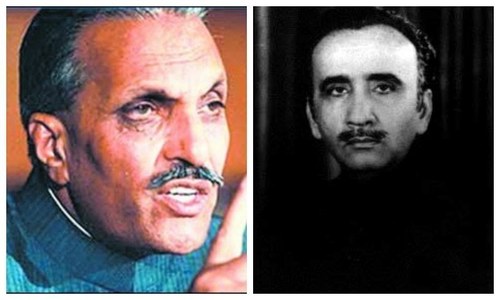April 10, 1988, would be remembered as a day of mass mourning; it was the day when in the early morning the twin cities of Islamabad and Rawalpindi received a dreadful shock. It all began with a low-density explosion, followed by a huge one, after which all kinds of missiles, rockets and projectiles started raining down in all directions.
This was something similar to the Lydia earthquake over 2,000 years ago in Italy. It created a lot of panic and fear; rumours of every kind gripped the capital — ranging from an Indian attack to a disaster at the Kahuta nuclear facility.
For many hours, no one could be found who could tell what had happened.
Also read: 20 years on, Ojhri Camp truth remains locked up
At that time Gen Ziaul Haq was attending a meeting of the Organisation of Islamic Conference (OIC) in Kuwait and had to rush back home. The officials assured the people that there was no reason for fear and that it was just an accidental explosion at the arms and ammunition depot at Ojhri, located between Rawalpindi and Islamabad.
But since the national psyche had been tormented with many mythical lies and unfounded stories, no one believed the official explanation.
Over a 100 people were killed and many more injured.
Zia wanted to save his men
Ojhri, an old-fashioned, World War II storage of arms and ammunition, was mainly made of brick barracks with thatched roofs. Previously used as temporary army units, after the Soviet occupation of Afghanistan, the influx of arms increased manifold and in 1979 the Inter-Services Intelligence (ISI) directorate chose the Ojhri Camp for temporary storage and disposal of weapons, as and when required.
Though not congested, the Camp certainly needed management. Gen Khalid Mahmud Arif, in his book Working with Zia mentions that on the ill-fated morning when some ammunition was being shifted from one place to another by a rather untrained team, an accident took place.
“At about 09:30am, a box containing 122mm Rocket fell from the top of the stack while the men were trying to slide it down. It hit the ground with a thud and exploded on impact, starting a fire which panicked the workmen ... It was fitted with an inbuilt percussion fuse, which, the experts claimed, could be activated by strong impact. In simpler language, this fuse had a point-detonating mechanism without an inbuilt safety device,” he wrote.
The chain reaction in the dump played the worst part.
Also read: Islamabad`s children of the mist
The prime minister was on a brief visit to Sindh; when he learnt of the disaster he immediately rushed to the capital. After initial inquiries he issued special orders for the rescue and rehabilitation of victims.
The most important question was to identify what caused the disaster and initiate an inquiry. On April 12, Junejo appointed a five-member inquiry commission headed by Gen Imranullah, corps commander of Rawalpindi, besides a five-member ministerial committee to conduct an inquiry into the tragedy.
This committee was to inquire into the matter and present a report to the prime minister who, after studying the findings, would, in turn, prepare his report for the National Assembly. The committee comprised Qazi Abdul Majid Abid, Mir Ibrahim Baloch and Malik Naeem Ahmad Khan, while Mohammad Aslam Khattak was to act as chairman.
Also read: Defacing the constitution
While taking all these actions, Junejo did not communicate with Gen Zia, creating tension between the two which led to the dismissal of the Junejo government and the dissolution of the assemblies.
Gen Zia wanted an inquiry by men of his choice, ostensibly if it was the fault of “his men” they would have to be spared.
Junejo knew it and perhaps that is the reason why he formed the committees before Gen Zia’s arrival. It is said that Gen Imranullah had held the director general (DG) ISI responsible for the tragedy and suggested appropriate action.
This was meant to hurt Gen Zia. Aslam Khattak’s report said that in war-like conditions that the nation was in, accidents can occur and should be considered as a token of martyrdom in the path of a noble cause; therefore, the four junior employees should be punished according to law and the rest be forgiven, to end the fiasco.
As the inquiry row continued, the National Assembly demanded the parliamentary committee report to be made public immediately and those found responsible be taken to task.
The defence minister, Rana Naeem Ahmed, wanted to get the report edited so that it could become more unanimous and acceptable. This ensued into an exchange of hot words and Aslam Khattak clarified that the report cannot be altered at any cost.
The defence minister started working on a new report. When Gen Imranullah was questioned, he blamed the director general of the ISI. After some re-investigation Rana Naeem wrote the report in which he clearly held the ISI responsible.
He wrote that since the Camp was under the DG ISI, action should be taken against the former DG ISI Gen Akhtar Abdur Rahman and the present DG ISI Gen Hamid Gul. The report once again saw hectic vetting and in early May 1988, prime minister Junejo handed over these reports, bearing signatures of the rest of the members, to Gen Zia. Junejo informed him that he would discuss the issue after his return from South Korea and the Philippines.
When the reports were presented, there was a lot of confusion in the presidential house and the general wanted to solve the issue in a manner that could spare his close associates.
Gen Zia’s biggest worry was Gen Akhtar Abdur Rahman, the man he trusted most.
Published in Dawn, Sunday Magazine, February 7th, 2016














































